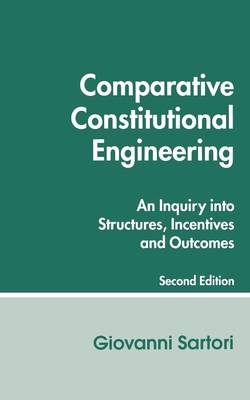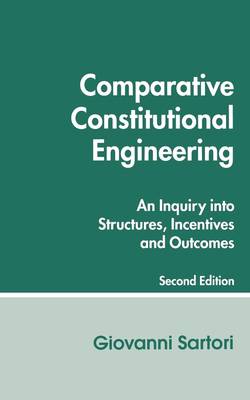
- Afhalen na 1 uur in een winkel met voorraad
- Gratis thuislevering in België vanaf € 30
- Ruim aanbod met 7 miljoen producten
- Afhalen na 1 uur in een winkel met voorraad
- Gratis thuislevering in België vanaf € 30
- Ruim aanbod met 7 miljoen producten
Comparative Constitutional Engineering (Second Edition)
Second Edition
Giovanni SartoriOmschrijving
The second edition of this pathbreaking, highly innovative comparative study in state-building by a major political scientist is a fully updated examination of the problems of making democratic government work.
Sartori begins by assessing electoral systems. He attacks the conventional wisdom that their influence cannot be predicted and also disputes the view that proportional representation is always best and will deliver 'consensus democracy'. He argues that the double-ballot formulas deserve more consideration for their ability to facilitate governability in adverse circumstances.
His comparative assessment of presidential and semi-presidential systems and the variety of formulas that are categorized, sometimes misleadingly, as parliamentary, looks at the conditions that allow a political form to perform as intended.
He concludes with a detailed proposal for a new type of government: alternating presidentialism. This meets the need for strong parliamentary control and efficient government, with safeguards against both parliamentary obstructionism and government by decree, and so could help to avoid political paralysis in Latin America, in the post-communist countries of Europe and in countries with dysfunctional parliamentary systems such as Italy and Israel.
Specificaties
Betrokkenen
- Auteur(s):
- Uitgeverij:
Inhoud
- Aantal bladzijden:
- 229
- Taal:
- Engels
Eigenschappen
- Productcode (EAN):
- 9780814780633
- Verschijningsdatum:
- 1/01/1997
- Uitvoering:
- Paperback
- Formaat:
- Trade paperback (VS)
- Afmetingen:
- 163 mm x 232 mm
- Gewicht:
- 353 g

Alleen bij Standaard Boekhandel
Beoordelingen
We publiceren alleen reviews die voldoen aan de voorwaarden voor reviews. Bekijk onze voorwaarden voor reviews.











